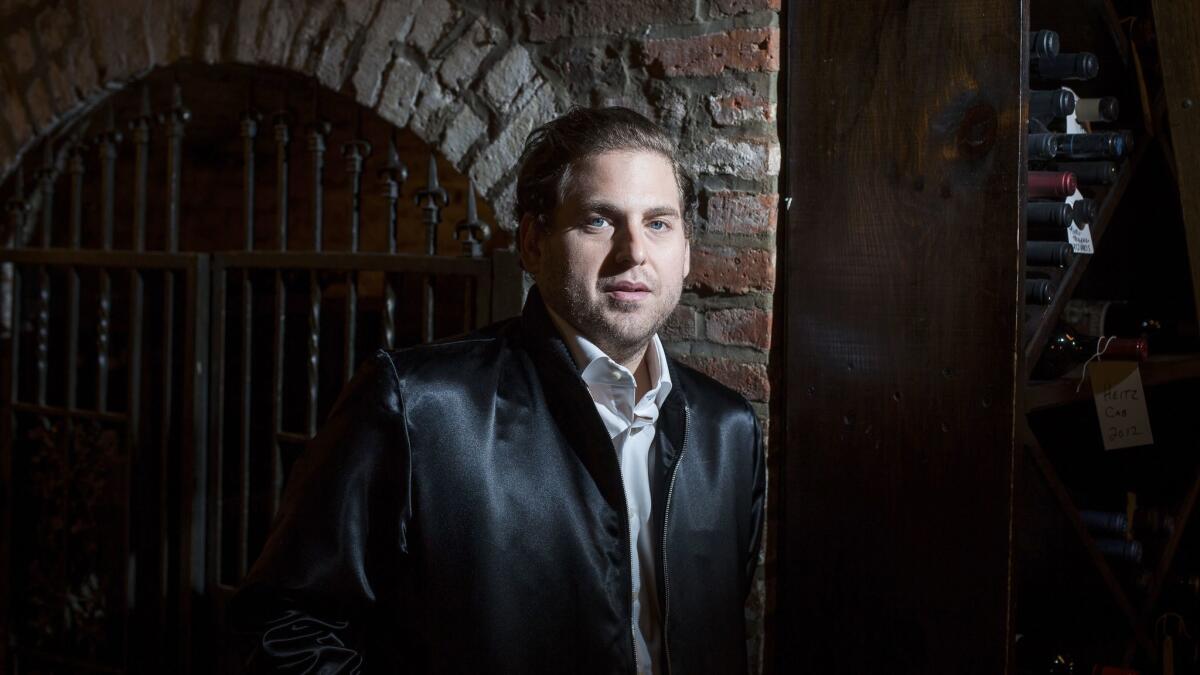Taking risks and not playing it safe are what draw Jonah Hill to those non-âbroâ roles

Reporting from New York City â Efraim Diveroli, the character Jonah Hill plays in the summer film âWar Dogs,â Todd Phillipsâ based-on-a-true-story film about two Yeshiva-educated Miami twentysomethings (Miles Teller plays the other) who rake in millions with a shady business supplying arms to the U.S. military during the war in Afghanistan, is probably not a guy youâd want to meet for lunch. Loud, duplicitous and greedy in the extreme, Efraim is a character who, if initially charming, would almost certainly leave you feeling compromised: You could imagine him ordering heaps of the priciest thing on the menu and then â laughing â leaving you holding the check.
Hill, apart from the charm, is nothing like that. Over lunch on a rainy Thursday in New York City, at his usual table at the rustic-Italian restaurant Il Buco, the 32-year-old actor, who has memorably appeared in such films as âSuperbad,â â21 Jump Street,â âThe Wolf of Wall Streetâ and âMoneyball,â earning Oscar nods with those last two, is polite, thoughtful and engaging. Heâs the kind of guy who will hold your chair and offer you the first bite of his risotto. (âWant some?â he asks, with apparent sincerity.)
Burned by the press for not being as bro-ish as some of his roles might indicate (âPeople want me to be a loud comedian and itâs just, unfortunately, not who I am,â he says, ruefully â though he claims partial responsibility for a notoriously bad 2013 Rolling Stone interview he says therapy has helped him push past), Hill, who hails from Los Angeles and lives in New York, comes off as careful, perhaps a bit chastened, yet candid and generous as he entertained questions about, among other topics, a performance critics have hailed as a standout in an otherwise dismissable film.
Todd Phillips said he had to pressure you into playing Efraim. What were your reservations?
Todd first asked me right when I finished âWolf of Wall Streetâ and I was worried about exploring another young Jewish dude who was chasing American greed. Todd kept doing rewrites and was really persistent. He asked me to read it one more time. I did and found Efraim different than Donnie in âWolf of Wall Street.â Donnie is just a bro whoâs blissfully following Jordan Belfort, so itâs very different to understand the kind of person who manipulates people with the intention of ⌠them over.
For Efraim, part of the sexiness of the scam is burning people, and thatâs a scary kind of person. Donnie didnât scare me; heâs just an idiot. But Efraim is brilliant. The most fascinating thing about him is the way he exploits religion. Itâs something that gives people such hope and safety, and when someone manipulates someone using that, thatâs a real dark act.

Jonah Hill and Miles Teller star in âWar Dogs.â
Did you feel uncomfortable playing a character who plays into Jewish stereotypes about money and greed?
Itâs important to call out when people hide behind religion. Wearing a chai and doing the things Efraim does â those people upset me. Being a part of a religion is not about excusing your [bad] behavior. I really lean into stuff like that. Iâm not saying all Jews are like this. Iâm saying, âLook at all our religions and look at the people who are exploiting them and taking advantage. Those people are ... up.â
Did you see any of yourself in Efraim?
Iâve typically said no to that question. But Efraim is charming and thatâs how he gets whatever he gets in life. I think thereâs a part of all of us, if weâre being brutally honest, that uses whatever weapon we have to get ahead, as not awesome as it is to admit.

I don’t like to be kind of surface. It’s a waste of time.
— Jonah Hill
I think thereâs an element of risk in this performance, and in a lot of your performances.
What really bums me out is when people in movies are scared to look not cool and you can see someone protecting that vulnerability and willingness to emotionally fall on your face. I, for better or for worse, cannot do that kind of stuff. When I was younger, I sometimes took movies people told me to take, and I can see that theyâre not good performances. Iâm not risking anything. I donât feel that way about âWar Dogs.â Itâs not a safe choice. Itâs ugly in all ways â emotionally, physically, everything.
I donât like to be kind of surface. Itâs a waste of time. That doesnât mean you canât be funny and light. But to me the funniest stuff is super-raw and hard to say or feel.
What about Efraimâs distinctive laugh?
David Packouz, who Miles Teller plays, told me if you met Efraim once, you never forgot him. I thought about people Iâd met once or twice but never forgot and I realized a lot of the time it was because they had a really distinct laugh. So I was like, OK, why is he laughing, and what does it sound like? The idea behind him laughing all the time was when youâre laughing with someone, youâre making them feel great and encouraging what theyâre saying. I was like, what a cool tool to get someone to love and trust him. Itâs like a sound saying, âKeep going, youâre great, keep going!â But itâs a manipulative way to say that.
Were you worried about how the real Efraim, who ended up filing a suit against the filmmakers, would respond to your portrayal?
I would have preferred if they had changed his name. I cannot imagine having someone make a movie about me. Iâd be horrified. So I completely identify with the real people Iâve played. Iâve made a joke out of it: âWhoâs playing me?â âLeonardo DiCaprio!â And the other guy, âWhoâs playing me?â âJonah Hill.â âWhat ...?!â
Youâre next acting role is playing Richard Jewell, the security guard who found pipe bombs in a backpack during the 1996 Summer Olympics in Atlanta, but youâre also writing and directing your own film, âMid 90s,â which is sort of a coming-of-age movie, right?
Iâve been writing this movie for three years. Itâs about being 13. To me that was the most confusing and hard age. It takes place in the skateboarding community in the mid-90s in L.A., but itâs really about finding a family outside your home. I wanted to show respect to skateboarding as a culture thatâs given me so much â so much creativity, so many friends, and kind of an ethos. Falling, picking yourself back up â those themes are applicable to all different parts of life.
More to Read
From the Oscars to the Emmys.
Get the Envelope newsletter for exclusive awards season coverage, behind-the-scenes stories from the Envelope podcast and columnist Glenn Whippâs must-read analysis.
You may occasionally receive promotional content from the Los Angeles Times.










